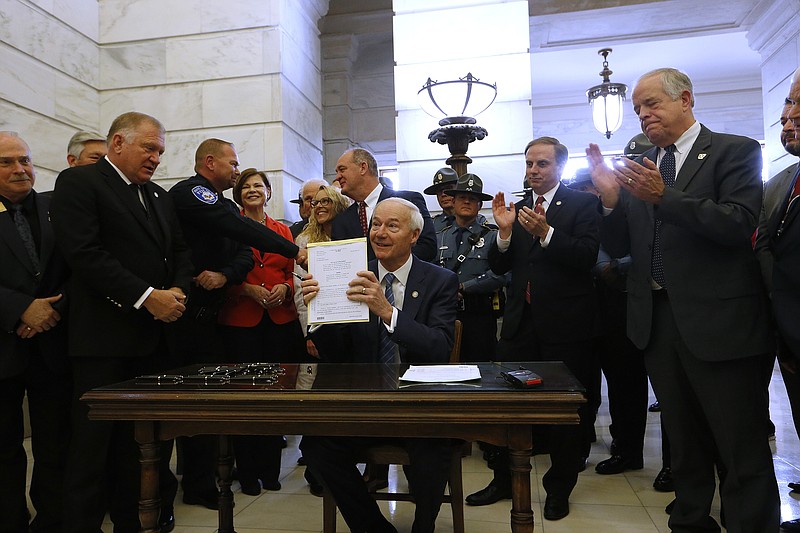The Legislative Council's personnel subcommittee on Wednesday advanced a plan to pay stipends of varying amounts to roughly several hundred full-time law enforcement officers at state agencies and higher education institutions who haven't received stipends from the state.
In a voice vote with no audible dissenters, the personnel panel recommended the Legislative Council, which meets Friday, approve the plan.
In last year's fiscal session, the Legislature and then-Gov. Asa Hutchinson enacted Act 224 of 2022 to grant one-time stipends to full-time city and county law enforcement officers, state parole and probation officers, and state troopers in fiscal 2023, which started July 1, 2022, and ends June 30.
Under Act 224, full-time and city- and county-certified law enforcement officers and state Department of Corrections probation and parole officers who are certified, would receive one-time $5,000 stipends and state troopers would get one-time $2,000 stipends.
Act 224 required the state's chief fiscal officer to transfer $50 million from the state's general revenue allotment reserve fund to a law enforcement stipend grant fund to provide the stipends. From the $50 million set aside, $38 million has been distributed and $12 million remains, finance department spokesman Scott Hardin said Wednesday.
Under Act 561 of 2023, the the Legislative Council's personnel subcommittee is required to make a recommendation to the Legislative Council regarding distribution of law enforcement stipends as grants no later than Sept. 15.
Under the proposal advanced by the subcommittee Wednesday, an eligible full-time law enforcement officer would be required to be an appointed law enforcement officer responsible for the prevention and detection of crime and the enforcement of the criminal, traffic or highway laws of the state, and be employed by and receive a salary authorized by an eligible state agency or public institution of higher education as a law enforcement officer on or before Jan. 31, 2023.
They also would be required to have statutory authority to enforce the criminal, traffic and highway laws and serve a law enforcement function of an eligible state law enforcement agency or public institution of higher education, be employed as a law enforcement officer for more than 24 hours per week, and have satisfactorily completed a program of basic law enforcement training at a school approved by the Arkansas Commission on Law Enforcement Standards and Training on or before June 30, 2023.
An eligible state agency or public higher education institution would fall into two groups under the plan.
Under the plan, Group 1 would consist of the secretary of state's office, the Game and Fish Commission, the Department of Transportation, the Department of Parks, Heritage and Tourism, and public institutions of higher education.
Group 2 would be determined by the submission of applications by state agencies that employ eligible full-time law enforcement officers. The applications would be submitted to the subcommittee starting Aug. 1 and no later than Sept. 10 on the form developed and provided by the subcommittee.
Rep. Jeff Wardlaw, R-Hermitage, said he expects a large number of state agencies that have a small number of law enforcement officers such as the Department of Human Services, the state Department of Health, Alcohol Beverage Control, and the Department of Agriculture will be part of Group 2.
An estimated 152 state law enforcement officers could qualify for the stipends in Group 2, said personnel subcommittee co-chair Sen. Breanne Davis, R-Russellville.
The state Department of Finance and Administration would be required under the plan to distribute law enforcement stipends in the form of grants to eligible full-time law enforcement officers employed by an entity in Group 1 in the same manner as those stipends were disbursed under Act 224, in the following amounts:
A Group 1 entity that provided an average salary increase of greater than 13% to its eligible full-time law enforcement over the past two fiscal years shall receive a a grant in the amount of $2,000 for each eligible full-time law enforcement officer.
A Group 1 entity that provided an average salary increase between 6% and 13% to its eligible full-time law enforcement officers over the past two fiscal years shall receive a grant in the amount of $3,500 for each eligible law enforcement officer.
A Group 1 entity that provided an average salary increase in an amount less than 6% to its eligible full-time law enforcement officers over the past two fiscal years shall receive a grant in the amount of $5,000 for each eligible full-time law enforcement officer.
A Group 1 entity that has already provided stipends to its eligible full-time law enforcement officers in the amount of $5,000 during the past two fiscal years shall be excluded from consideration for additional disbursements from the law enforcement stipends set-aside fund.
The subcommittee would be required to make a determination regarding stipend amounts for entities determined to be part of Group 2 based on the number of applications received and the amount of funds remaining in the law enforcement stipends set-aside following payment of the grants to the Group 1 eligible full-time law enforcement officers.
Rep. Lane Jean, R-Magnolia, questioned who is responsible for applying for stipends for law enforcement officers at airports in Arkansas. Tony Robinson, personnel review administrator for the Bureau of Legislative Research, said he doesn't believe law enforcement officers at an airport would be eligible for the stipends under the latest plan.
Jean said he doesn't know why the state would have paid stipends to city law enforcement officers but not pay them for law enforcement officers at airports.
